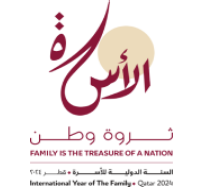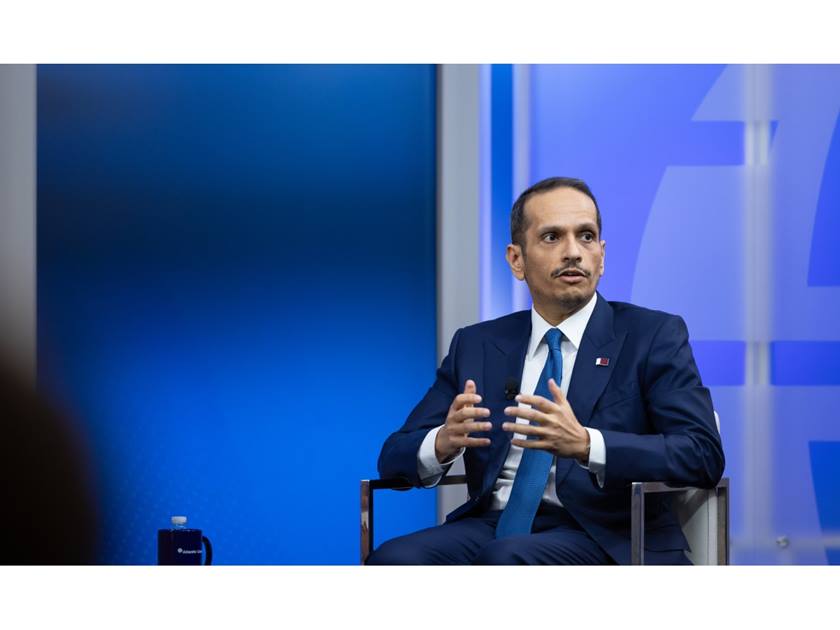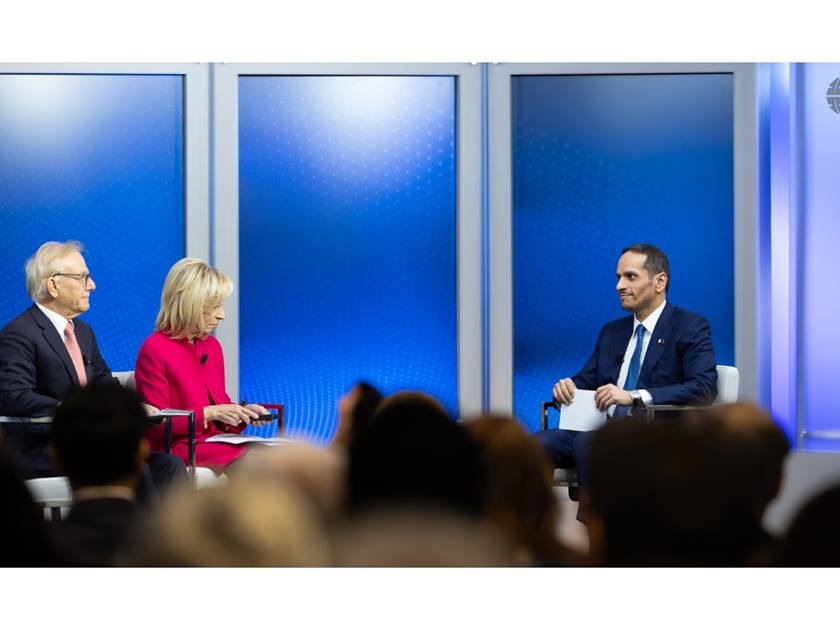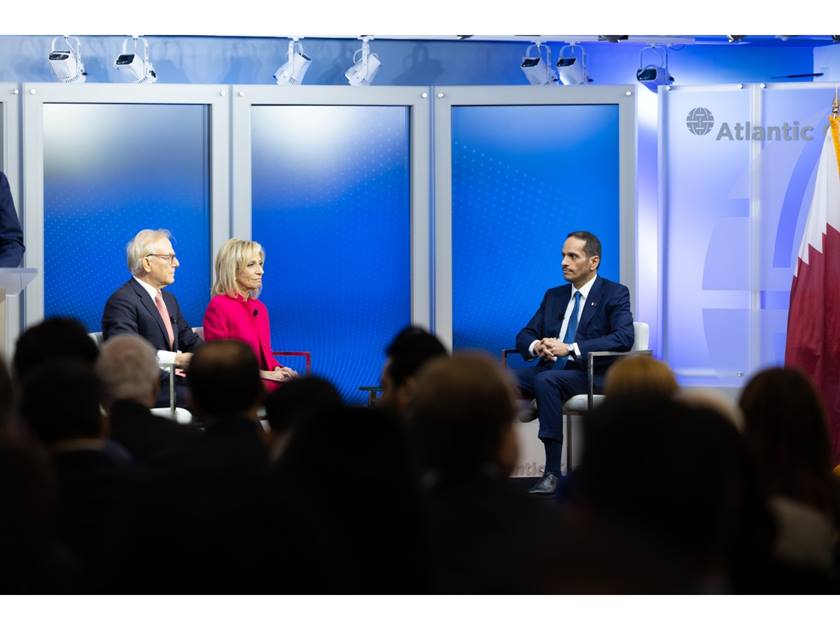Washington, January 30 (QNA) - HE Prime Minister and Minister of Foreign Affairs Sheikh Mohammed bin Abdulrahman bin Jassim Al-Thani stressed that there is a progress in the ongoing negotiations for a hostage and prisoner exchange between Hamas and Israel, which could lead to a permanent ceasefire in the future, calling on both parties to take this opportunity to end the war.
In a discussion session at the Atlantic Council, His Excellency said that a good progress was made yesterday which got things back on track and laid a foundation for the way forward. He added, "We cannot say that this makes us..in better shape very soon." However, he said, "But we are hoping, actually, to relay this proposal to Hamas and to get them to a place where they engage positively and constructively in the process." because of what His Excellency described as "The only way to get the situation de-escalated." expressing hope that both parties use this opportunity to stop the war and get the hostages back to their homes." His Excellency said, "There was a clear demand of the permanent cease-fire ahead of the negotiations," adding that His Excellency believes that things moved forward to what he described as "A place where it potentially might lead to a cease-fire permanently in the future. And this is what we are all aiming for, because we've seen also the suffering of the people in Gaza and we've seen the amount of destruction over there." "Now, our main role as mediator is trying our best to get a negotiated solution where it can bring the hostages safely back to their homes, yet also stopping the bombing, you know, and the continuation of the killing of the civilians. We've seen the numbers are increasing dramatically." His Excellency added.
HE the Prime Minister and Minister of Foreign Affairs said, "Putting an end for this war now is becoming not only a demand of the people in Gaza; it's a regional demand, and it's getting beyond this. We have seen the amount of destruction that's happened. We have seen the number of victims." Regarding Hamas's position and achieving a breakthrough to reach an agreement, HE the Prime Minister and Minister of Foreign Affairs said, "We are an intermediary party here. We are not a party of this conflict and we are trying our best to bridge the gap is the framework that yesterday been agreed upon with all the parties, was a framework based on what's been proposed by the Israelis and what's been a counterproposal from Hamas and we tried to blend things together to come up with some sort of a reasonable ground that brings everybody together." As for Hamas's response, His Excellency said, "Now, we don't know and we cannot predict what Hamas's response will be and we are sure that we will be faced with some challenges and obstacles... it's not an easy process since we embarked on it from day one in the war, but we are committed to continue to carry forward and to come up with some solutions that provide the ground for everyone to move forward." Answering a question regarding the State of Qatar's ability to pressure Hamas, His Excellency said, "Our role is mediator. We try to bring the parties to bridge the gaps between them... pressuring both of them by words, by meetings, by commitment, by addressing the issues with some solutions. That's the pressure and the leverage."
His Excellency stated that beyond that the State of Qatar cannot impose anything on neither sides, adding, "We are using our good offices to connect, to bridge gaps, to put solutions, to come up with some alternatives." His Excellency said that through this approach, Qatar has been successful in reaching an agreement between Hamas and Israel to establish a humanitarian pause and conduct an exchange of hostages and prisoners in November, as well as Qatar's successful mediation between the United States of America and the Islamic Republic of Iran, and between the United States and the Taliban, in addition to Qatar's accomplishment in reuniting some Ukrainian children with their families in Ukraine, adding that this is how Qatar operates.
Regarding allegations directed at some United Nations Relief and Works Agency for Palestine Refugees in the Near East (UNRWA) employees, HE the Prime Minister and Minister of Foreign Affairs said during the discussion session at the Atlantic Council, "It's the only agency that can provide help and aid for the Palestinians in Gaza and the West Bank."
His Excellency added that UNRWA's role in that regard is very important and that the Agency suffered from a funding shortage in the past few years. His Excellency said that if there are allegations against some employees, then these allegations must be investigated, adding, "UNRWA needs to take their measures, according to their charter.
But it cannot be punished because of the act of some employees." Responding to a question about whether the ongoing negotiations includes a faster delivery of humanitarian aid to the Gaza Strip, His Excellency said, "We've been repeatedly saying... it's not a way to use the humanitarian aid, as a leverage or as a pressure on the people.
People in Gaza are dying from starvation. We have seen the suffering that they are going through is something unprecedented. We've never seen before in any conflicts."
His Excellency added that even the shelters and safe corridors that were named since the beginning of the war, were also bombed, leaving no safe place for the people of Gaza.
Regarding whether the attack on an American base in the Hashemite Kingdom of Jordan might affect the ongoing negotiations to calm the situation in the Gaza Strip, HE Prime Minister and Minister of Foreign Affairs Sheikh Mohammed bin Abdulrahman bin Jassim Al-Thani said: "We've been warning from day one that this war has a potential of expanding and spillover in the region.
I hope that nothing will undermine the efforts that we are making or jeopardize the process. Yet, it will definitely have an impact. One way or another, it will have an impact on the region's security. And we hope that things get contained and not to get escalated beyond control." "We condemn any act that tries to undermine the security and stability of the region.
Infringing the security of a country like Jordan or even killing soldiers who are part of a coalition that we are a member of is not something that can be acceptable. In order to rescue the region from suffering and stop further escalation, a solution must be found to what's happening in Gaza. We don't encourage any attacks to happen in any country in our region and we are calling for de-escalation to contain the situation as much as possible," His Excellency added. His Excellency continued: "Our region cannot just live with further escalation, and we must focus on the main issue of restoring peace in Gaza as it will be the key to defusing all other escalations in the region.
I believe that for us the main focus should be on how we contain the situation, ways to de-escalate it, and how to address the real issue and not just to treat the symptoms." In response to a question about coordination between the State of Qatar and the Islamic Republic of Iran to contain the escalation in the region, HE Prime Minister and Minister of Foreign Affairs said: "We are in continuous conversation with Iran as well others about the situation and escalation in the region. We would like Iran to use its links and relations with all parties to de-escalate and not get the situation out of control. Disrupting the trade international trade in the Red Sea is something affecting all of us. Freedom of navigation is something very important for the State of Qatar, the entire region and the world." Regarding the Israeli Prime Minister's statements rejecting the establishment of a Palestinian state, His Excellency said that he doesn't want to comment on such statements and that the State of Qatar is not expecting thanks from him. He added that "the State of Qatar understands its role and everyone is aware of its importance and integrity. We have been very transparent with everyone from the beginning and our role has proven that it's getting results and not just putting out some statements or using it for political exploitation." On likening the State of Qatar to the United Nations (UN) and the Red Cross, His Excellency stated that "those are humanitarian organizations and we are proud to be among this club." His Excellency also stressed that "the only way forward to have a peaceful region is a two-state solution. That's what the State of Qatar stands for and what we believe in. It's what we believe that the entire region has adopted a long time ago.
The two-state solution of course needs partners on the other side. If we see a leader on the Israeli side who is opposing such a solution, then what's the alternative?" His Excellency continued: "For the State of Qatar as well as the Arab countries, we believe in peace and we support the Palestinian cause. We support two peoples living side by side peacefully together. When we saw hope in the 90s after the Madrid and Oslo negotiations, the State of Qatar was the first country in the Gulf to open a trade office with Israel, but we saw that the other party or the partner for peace wasn't serious about it and that's when we decided to close this channel. The only way forward is a two-state solution and whoever is accepting of this principle, I believe should be dealt with in a very positive manner." In response to a question about the nature and form of governance in Gaza and Palestine after the end of the war and the position of the State of Qatar on that, HE Prime Minister and Minister of Foreign Affairs said: "Our position is that the fate of the Palestinians should remain at the hands of the Palestinians. They are the ones who should decide what will be the way forward. For us, we see that the way forward cannot be addressed separately or in isolation from the West Bank. There should be one government that takes care of Gaza and the West Bank together.
This is a decision of the Palestinians, the Palestinian factions. Those are the ones who can decide who should govern them, not the State of Qatar, Israel or anyone else. I believe that we are not in a position to make decisions on behalf of the Palestinian people." Regarding the statements of the Israeli Prime Minister and some American officials that the future Palestinian state must be demilitarized, His Excellency said: "Any peace plan should include enough security guarantees for both people so that they don't represent threats to each other."
On the future of the region in five years if Qatari mediation succeeds in ending the war in the Gaza Strip, HE Prime Minister and Minister of Foreign Affairs Mohammed bin Abdulrahman bin Jassim Al-Thani said: "Well, it depends to what direction this mediation will if we will get to a situation where the war's ended and we go back to the same previous status, which is separate Gaza and the West Bank, no hope for a particular resolution, and the region remains as a hostage of, you know, some political dynamics happening here or there, then we are going to be in a much worse situation five years from now and the situation will not the attack that happened on October 7, there is another one, there is a bigger war will happen."
During the discussion session, His Excellency added: "If we are going to seize this opportunity, we are going to ensure that after this there is an international commitment for a peaceful resolution, for a two-state solution; there is a clear path for the Palestinians, for their statehood; then it will be a much better picture for all of us and much better prospective in the region. And we are hoping to choose this path," pointing out, "Well, I think that there is ongoing, regional efforts right now together with some international partners in order to see what's the way forward. I think that all of us, we are very much calibrated toward how to seize the opportunity right now and to put everything on track and to go toward a two-state solution and a peaceful resolution in the entire region. If we can put an end for this conflict that's been lasting for decades the entire face of the region will change."
Regarding Qatar's efforts to release the hostages, HE the Prime Minister and Minister of Foreign Affairs said: "We have been trying our best to get those hostages free, and this is something that we've been doing from day one, even without being asked. When we saw the situation erupted, we reached out to Hamas right away and we demanded the release of all the hostages. We have been very persistent and committed to the process that led to the release of many hostages earlier. We are hoping for this process to continue to produce for us some good results and release the rest of them... as long as it's going to result with saving a single life; that would be worth it for us. And that's what Qatar stood from the beginning and will continue standing for." Responding to a question about whether the State of Qatar has influence on the leaders of Hamas who live there, HE Sheikh Mohammed bin Abdulrahman bin Jassim Al-Thani said: "Qatar has Hamas political office now for almost eleven years. It happened in full coordination with the United States to establish communication channels and to be used in resolving the situation in the region. It has managed multiple de-escalation ceasefires throughout the years. And it's proven to be effective.
We hosted Taliban political office that resulted to the agreement between US and Taliban. And it doesn't mean that being there, hosting them, is a leverage that we have over them. And Qatar's role has been very clear, very transparent, dealt with in very close coordination, whether it's with the US or with the other parties that are related to any conflict. So we don't see this as a point of leverage. We see this as a point as a channel of communication that we are using always for good causes." Regarding the relations of the State of Qatar with the Kingdom of Saudi Arabia and the countries of the Cooperation Council for the Arab States of the Gulf, His Excellency confirmed that they are in very good condition, pointing out, "It's not just, you know, a traditional relationship; it's a historical bond between all the countries. We are connected families. The societies are very much connected." His Excellency added that the State of Qatar is also working closely with Saudi Arabia to contain the escalation in Gaza.
On the relations between the State of Qatar and the United States of America, HE the Prime Minister and Minister of Foreign Affairs stressed that the relations between the two countries have been always strong and that they have had an alliance for decades and it's not only on defense, security, and regional security, indicating that there is a strong economic partnership between the two countries and there is a huge investment presence for the State of Qatar in The United States and huge investments by American companies in Qatar, in addition to a partnership in the energy sector, and there are also close partnerships in the field of education as there are six US universities in Qatar serving as a hub for the region to be provided with a US education within the region His Excellency explained that the relationship between the State of Qatar and the United States is institutional, adding, "When we see that we are helpful and we can provide support for the US in different conflicts we always, of course, look at this as an opportunity just to strengthen the bonds between our two countries.
And I believe that this is something good for Qatar to have reliable partners such as the United States, but also good for the United States to have a reliable partner like the state of Qatar." With regard to the developments in the situation in Sudan, HE Prime Minister and Minister of Foreign Affairs Sheikh Mohammed bin Abdulrahman bin Jassim Al-Thani, at the conclusion of the discussion session at the Atlantic Council, said, "What's happening in Sudan is heartbreaking for all of us. And we've seen the suffering that the Sudanese people has been going through now for the last year." His Excellency added that Qatar right now is not playing any specific role in what's happening in Sudan, and that there are Saudi-sponsored talks between the parties to the conflict in Sudan, and Qatar strongly supports these talks in order to reach an agreement and stabilize the situation in Sudan as soon as possible. (QNA)




